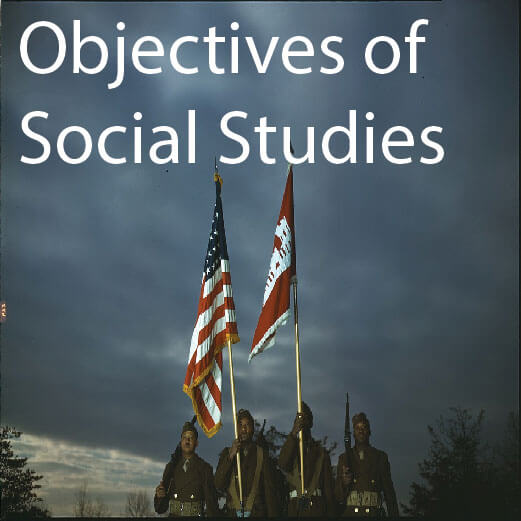- Social Studies
- What Is Social Studies
- Objectives of Social Studies
The Objectives of Social Studies: Why Does Social Studies Matter?
 Color guard of African American Engineers. Photo courtesy of Library of Congress.
Color guard of African American Engineers. Photo courtesy of Library of Congress.The objectives of social studies are to help the learner understand the past, relate that understanding to the present time, and use that understanding in making choices for life's situations. Social studies is an important learning area because it helps children learn about their own cultural roots as well as those of others. It also teaches them how different aspects of our lives are interconnected. Social studies emphasizes the importance of civic engagement and service to the community. It also helps children learn about themselves, their peers, their families, and what they can do to make a difference in society.
The importance of social studies education is evident in the objectives of social studies. By learning about the world around them, students can better understand their place in it. They can also learn how people and societies are organized, and explore different cultures to see how they interact. In addition, students can learn about political systems and the ways people govern themselves. They can also examine economic systems and issues related to resources, production, and distribution. Finally, students can study the history of human beings and their civilizations. All of these skills are important for students as they move into adulthood.
Teaching social studies requires teaching students how to access information, make informed decisions, and prepare for their futures. This is exactly what I want to do as a social studies professional. As my students learn about cultures around the world, they can develop an appreciation of different ways of life and become respectful of people who are different from them. Social studies education can also help students develop critical thinking skills so that they are better prepared when they enter the workforce or continue their education in college or university.
Understanding the World
As a social studies professional, I have always considered it a primary social studies objective to help students use content and skills to better understand the world around them. To me, one of the most important objectives of social studies is to help students develop an understanding of other people and cultures.
Critical Thinking Skills
Another key goal of social studies is to helps student develop their critical thinking skills. This is important, as students will need to be able to think critically to make informed decisions in their lives. They will also need these skills when they enter the workforce. With social studies education, students can get a head start on preparing for their futures.
Knowledge for Citizenship
As students develop citizenship knowledge and mastery content in history, geography, economics, and so on, they can also develop problem-solving skills, learn more about social justice, and further their personal development (self-concept) by learning more about their place in their communities and the world.
Social studies education helps students learn how to be responsible citizens. This begins with learning about the history of their country, state, community, and local areas. As students explore different cultures through what is learned in social studies education, they can come to understand that there are many ways to do things right. For example, there are many different ways to celebrate holidays and many different opinions on religion. Students can learn that we live in a free society, where people are expected to follow some basic rules for the good of everyone involved.
Social studies also helps students learn about citizenship knowledge so that they can become better citizens. Students can build on the information and skills they receive in school to make informed decisions as adults about their communities, states, and nation. They can also play an active role in the democratic process by voting or attending community meetings where important decisions are being made.
Transmit Social Science/History Knowledge
History, geography, economics, and government are all bodies of knowledge that can be mastered. Mastering social studies content is important for several reasons: it helps students get ready for college or other professional training; it gives them necessary skills to function as informed and responsible citizens; and it ensures that they can engage in serious critical thinking.
Develop Inquiry Skills: Solve Problems and Make Decisions
Social studies education is a process of inquiry. Inquiry requires that students have the skills to solve problems and make decisions. It also requires that they develop their ability to access information from both primary and secondary sources, as well as their ability to use research tools such as libraries, computers, books, and Internet resources. In addition, social studies education can give students the skills to construct arguments and defend their points of view.
Promote Personal Development: Develop Empathy, Self-concept, and Identity
As students learn about history, geography, and different cultures in social studies education, they develop an understanding of their own identity. They begin to understand that who they are is influenced by where they live and the people who live there with them. Through social science/history education, students also gain a better sense of self-concept.
Social studies education can also help students develop their identity. When asked what comes to mind when they hear the word "social studies," many people say "social problems." However, social studies is more than that. Social studies is about exploring all kinds of cultures, peoples, history, and social settings. It is about exploring who we are as individuals.
Promote Social Justice: Values and Attitudes that Support Democratic Ideals in a Multicultural Society
As students learn more about the world around them, they develop their sense of what is right and wrong. They begin to see that many people from different cultures have different values. In school social studies lessons, there should always be a focus on democratic ideals and multiculturalism. Teachers can help students understand that our society is made up of many people from different cultures and religions, all of whom have rights to be respected. In addition, students can learn that everyone makes mistakes and has something worthwhile to offer.
Understand Community Issues
The study of location, place, and environment is central to social studies education. The connections between who we are and where we live are important in understanding the world in which we live. This aspect of social studies education also helps students understand their own community—its physical features, history, culture, diversity issues, economy, unique problems or challenges, and future development.
Understand the Impact of Technology and Its Role in Modern Society
The use of technology is an important part of our society. We are constantly surrounded by it in the form of computers, tablets, smartphones, video games, etc. Students need to learn about the importance and impact that technology has had on modern life—how it has brought people together but also how it can isolate them; how social media has changed the way that we communicate; how computers, video games, and social media can be used for entertainment but also to advance one's career.
Understanding the impact of technology on our society is important so students can learn critical thinking skills to discern what information they should or shouldn't believe online.
Develop Historical Perspective: Understand the Past to Make Sense of the Present and Prepare for the Future
We learn about history to create a better understanding of ourselves, our communities, and our world. History is made up of both facts and memories. As students develop their historical perspectives, they become aware that the past contributes to the present just as much as what happens today will contribute to tomorrow.
Understand Dissent, Freedom of Speech, and Compromise
There are many aspects of democracy that students need to learn about. One is the importance of dissent in a democratic society. Dissent has played an important role in advancing social causes and receiving rights for different groups. Another aspect of democracy is freedom of speech, which means that you can say what you want without worrying about getting into trouble or being punished. The last aspect of democracy that students need to learn is compromise. Compromise means that when making a decision, you need to be able to consider the needs and opinions of others, even if they don't agree with yours.
Understand How Our Economy Works
In a democratic society, the economy of a country is of paramount importance. When we better understand what goes on in the economy, we can make informed decisions about our own lives and about social responsibilities we may have as citizens (e.g., paying taxes). We need to learn about the different sectors of our economy (e.g., agriculture, manufacturing, retail), how people decide what products to produce or not produce, and what affects the cost of goods or services in different industries.
Understand the Impact of Our Environment on Us and How We Affect It
The study of geography is critical in helping students understand not only where things are located around the world, but also what factors make these locations different from one another—climate, natural resources, population density, etc These differences among places will affect how people in these areas live their lives—how they get water, food, shelter, take care of the sick, grow their crops, etc.
Democratic Principles Such as the Rule of law, Equal Protection, and Freedom under the Law
The guarantee of equal protection as outlined in the Fourteenth Amendment to the Constitution is a crucial aspect of democracy. This amendment ensures that no person or group will be denied their rights without due process of law. Moreover, all people are entitled to "life, liberty, or property" without harming others through the rule of law. Social studies education helps students to understand these principles and the great sacrifices made by many to develop and advance these principles.
Global Issues and Their Impact on Our Country, State, and Locality
Social studies is not just about our country, but also about the world we live in. Many of the issues that affect us nationally and internationally (e.g., terrorism, climate change) can be addressed through social studies education.
10 Themes of Social Studies
The National Council for the Social Studies has developed 10 Themes for Social Studies that encompass the major objectives of social studies. Their 10 Themes are
- CULTURE
- TIME, CONTINUITY, AND CHANGE
- PEOPLE, PLACES, AND ENVIRONMENTS
- INDIVIDUAL DEVELOPMENT AND IDENTITY
- INDIVIDUALS, GROUPS, AND INSTITUTIONS
- POWER, AUTHORITY, AND GOVERNANCE
- PRODUCTION, DISTRIBUTION AND CONSUMPTION
- SCIENCE, TECHNOLOGY, AND SOCIETY
- GLOBAL CONNECTIONS
- CIVIC IDEALS AND PRACTICES
These 10 Themes illustrate both the breadth of social studies as a field and the critical nature of the discipline in developing effective citizens as well as critical thinkers and problem solvers.
The Objectives of Social Studies: Developing Units & Lessons
Another way of thinking about the objectives of social studies is to consider them in light of the units and lessons that are taught.
There are objectives for social studies education at every grade level K-12. These objectives continue taking shape as children grow and move through their educational careers. Here is an example of objectives that matter most to young elementary school students:
- Students will develop social studies knowledge and skills in the history of the United States beginning with Native American civilizations and continuing to contemporary times.
- Students will develop an understanding of people, places, events, and ideas that have shaped the course of history.
Teachers can use these objectives to create lesson plans based on what children need to know at each grade level. For example, a first-grade teacher may plan to teach students about Native American civilizations during the first semester, and start teaching them about contemporary times from eighteenth-century America to the present day in the second half of the school year.
The Objectives of Social Studies Vary
In certain states or regions, objectives may vary depending on whether a student is studying history as an English Language Learner (ELL), as opposed to a native speaker. Because English Language Learners find it easier to remember new words and concepts when they are taught visually, objectives for ELL students may include more pictures and visuals than objectives for non-ELL students.
Objectives of social studies education vary depending on the topic area that is being studied. For example, objectives that apply to a lesson plan on Native American civilizations would be different than objectives that apply to a lesson plan for the earliest settlers of America.
Often social studies lessons and units will incorporate content and ideas from a variety of disciplines including history, geography, economics, and civics.
Social Studies Plays an Important Role in the Development of Citizens
Social studies education is an important subject that utilizes content from many disciplines. Objectives for social studies include developing citizenship knowledge and mastery content in history, geography, economics, and so on. Social studies can also help students develop problem-solving skills by learning more about their place within a community or society as well as understanding how people govern themselves. Finally, it can give students a head start when they enter the workforce because social studies helps them develop critical thinking skills and understand different cultures through studying other civilizations throughout time.
Conclusion
Social studies plays an important role in the development of citizens. It develops citizenship knowledge and mastery content in history, geography, economics, and more. In addition to these benefits, social studies can help students develop problem-solving skills, critical thinking skills, and understand different cultures.
Access a PDF version of this article here.
Return to What is Social Studies.


New! Comments
Have your say about what you just read! Leave me a comment in the box below.